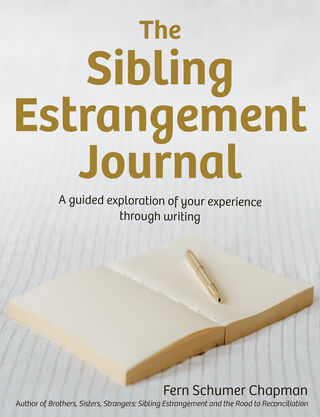Family Dynamics
How Writing It Out Can Help Estranged Siblings Cope With Grief
Journaling offers a kind of therapy to process our losses.
Posted November 10, 2022 Reviewed by Gary Drevitch
Key points
- Self-directed therapy in a journal with focused content is an effective tool for reducing symptoms of depression and anxiety.
- Writing helps to organize thoughts, label emotions, and gain self-confidence, among other benefits.
- One study found that participants who wrote about their traumas improved their well-being.
A survey for my first book on sibling estrangement produced many stories and statistics about this under-studied phenomenon. But I was most struck, over and over, by how respondents described the pain of the experience and the relief they found in the process of completing my survey.
A cutoff from a brother or sister often results in a profound, never-ending cycle of grief like none other as the estranged mourn the living. Many have no idea why the estrangement occurred, and they ruminate about it. I learned that estrangement is not just the end of a relationship with a brother or sister; many find that the experience raises elemental self-doubts, as it can erode one’s identity, self-esteem, ability to trust, and relations with other family members.
Few who are unacquainted with estrangement understand the experience and its depth of guilt, shame, or pain. Even fewer want to talk about it. While support groups exist for the estranged, many who endure this trauma are reluctant to join, fearing exposure or worsening of their scars. And, of course, not everyone can afford private therapy to address the hurt and its fallout.
I was pleased, however, to learn that those who filled out my survey were comforted by putting their feelings into words. Many reported that the survey offered a private, emotional outlet to understand and process the grief of sibling estrangement:
- "It feels therapeutic to tell my story again."
- "It helped me to think more deeply about the nature of my sibling estrangement instead of just feeling bad and anxious about it. It was challenging to answer the questions, but it ultimately helped me to move forward."
- "Once I recorded on the page some of my feelings about sibling estrangement, I didn’t carry around the same sadness and weight."
These comments sparked an idea.
New trend: Workbooks as self-directed therapy
A year ago, the New York Times published an article headlined, “Feeling Anxious? Grab a Pen and Paper and Start Journaling," identifying a new trend in publishing: “Guided notebooks that borrow principles from therapy are becoming more popular.”
“Individuals are seeking out treatment at levels we’ve never seen before,” Vaile Wright, senior director of health care innovation at the American Psychological Association, told the Times. She said that self-directed therapy in a journal with focused content can be an effective tool for reducing symptoms of depression and anxiety.

Upon reading the article, I thought, why not create a guided journal that specifically addresses the grief of estrangement from a brother or sister? Such a book would have greatly benefited me during the dark days when I was estranged from my only brother. So I followed the old adage of publishing and created the book I wished for: The Sibling Estrangement Journal: A Guided Exploration of Your Experience Through Writing.
The Value of Writing
The work of psychologist James Pennebaker of the University of Texas at Austin, a pioneer in writing therapy, confirms the value of emotional or expressive writing as a form of narrative therapy. He recommends writing non-stop, for 20 minutes each day, to make sense of emotions and to construct meaning from experiences. In a landmark research project, he confirmed that the practice of writing from the heart about emotions and stress can improve well-being.
In Pennebaker’s study, students were randomly assigned to write about either traumatic experiences or superficial topics for four consecutive days. Pennebaker assessed the well-being of each participant six weeks after the writing sessions and found that those who had written about their traumatic experiences reported more positive moods and fewer illnesses than those who wrote about everyday experience. Pennebaker’s research has been replicated and validated, particularly for those who suffer with PTSD. Pennebaker also learned that this form of writing can boost immune functioning in patients with such illnesses as HIV/AIDS, asthma, and arthritis.
Writing by hand adds to the benefits — not the least of them being that it’s a great way to get offline and unplug. It also creates a mind-body-spirit connection: The writer is communicating with another part of his or her self, bringing unconscious thoughts to the fore that can lead to important insights. Once experiences are recorded on paper, the writer no longer carries the emotions so heavily.
Social psychologist Karl Weick is known for his wise saying: “How do I know what I think until I see what I say?” A writing journal offers the unique opportunity of learning what you think by reading your own words. Journal writing has other surprising benefits. It helps to:
- Organize thoughts
- Identify and pursue goals
- Prioritize problems, fears, and concerns
- Label emotions and acknowledge traumatic events
- Track progress and growth
- Gain self-confidence
- Express gratitude
- Improve writing and communication skills
- Find inspiration
- Strengthen memory
For the estranged, this form of narrative therapy has another advantage. Sibling estrangement carries a stigma so deep that many avoid discussing the topic. And estrangement casts suspicion on everyone involved. Whether the cutoff was a choice or the relationship simply faded away, estranged siblings are caught in a swirl of judgments and doubts. The sibling who ends contact — the shunner — may be haunted by the daunting question: How could I be so heartless as to cut off my own sibling? Meanwhile, the shunned may be plagued by the corresponding question: What’s wrong with me that my sibling doesn’t want anything to do with me?
A guided journal provides a safe place to begin the process of breaking silence and rejecting shame. Writing provides an opportunity to reach powerful realizations, gain insight, and discover resilience and truth — all between the self and the page.
References
Safronova, Valeriya, (October 10, 2021). "Feeling Anxious? Grab a Pen and Paper and Start Journaling." New York Times
Pennebaker, James W. "Telling Stories: The Health Benefits of Narrative." Literature and Medicine, vol. 19 no. 1, 2000, p. 3-18. Project MUSE, doi:10.1353/lm.2000.0011.




